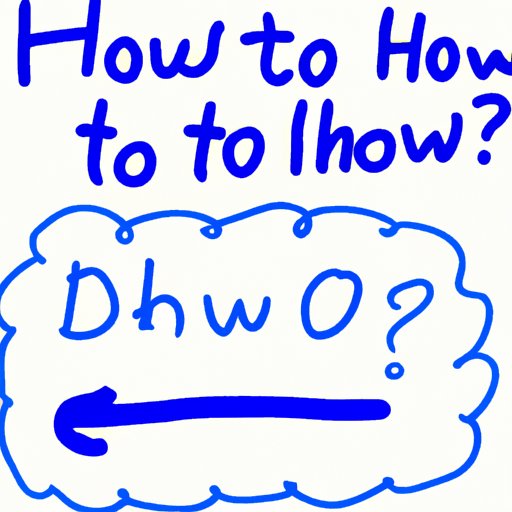
Introduction
Drawing bubble letters can be challenging for those new to it or even seasoned artists who lack experience. Bubble letters are a dynamic and fun way to make an impact and grab attention on any project. From signs to school projects, bubble letters can be used in countless ways. In this article, you will learn how to draw bubble letters, step-by-step. You will even get printable practice sheets to help you master your technique.
Step-by-Step Guide
Bubble letters are defined by their thick, rounded edges and continuous lines. Unlike standard block letters, bubble letters give a fun and playful effect to any design. Below you will find easy-to-follow steps, accompanied by visuals to help guide you through the process.
- Start with the Basic Structure: Begin by drawing your letters in a basic structure. This allows you to create a foundation to build upon. Draw your letters using simple shapes such as circles and ovals. Make sure your letters are sized and spaced properly to avoid any distortion in the final product.
- Thicken the Lines: Next, we thicken the lines. Bubble letters are known for their large, thick lines. Use a pen or marker to trace around the outer edge of your letters. Make sure you consistently trace the lines on your letters to avoid unsightly irregularities and bumps.
- Add Depth: Using a thinner pen or marker, add a second line to the inside of your letters. This will add structure and depth to your letters. Your letters should begin to resemble a three-dimensional object.
- Color and Fill In: Once you complete the structure of your letters, it’s time to add some color. Using your choice of markers, fill in each letter. Make sure the colors are even and solid. This will give your letters a bold, eye-catching look.
Tools and Materials
Having the right tools and materials is essential to creating beautiful bubble letters. Below are some of the basic materials you will need to create your designs:
- Marker Pens: Use a marker pen with a chiseled tip to create the thick and thin lines needed for bubble letters. Some popular choices for pens include Sharpie, Staedtler, and Faber-Castell.
- Paper: Smooth or glossy paper works well for drawing bubble letters. Avoid papers that are too rough or textured because they can interfere with the ink application.
- Pencil: Use a pencil to sketch out your letters in the beginning stages of the drawing process. This allows you to make mistakes without permanently marking the paper.
- Eraser: Keep an eraser handy to fix any mistakes made while sketching and creating the final copy.
Practice Sheets
Practice makes perfect, and that’s why we’ve provided some printable practice sheets for you to work with. The practice sheets allow beginners to master the basic structure of bubble letters. Print as many sheets as you need, and use a pen or marker to create your letters. Use these sheets as a guide to get started before moving on to more complex designs.
Add Some Creativity
Bubble letters are versatile, and the possibilities for adding your own unique touch to your designs are endless. Adding your own personal flare will make your letters stand out and make your project that much more memorable. Below are some tips to help you get creative with your bubble letters:
- Choose the Right Colors: Choose colors that compliment each other well. Consider adding a color wheel to your supplies to help you choose the right color combinations.
- Add Backgrounds: Adding a background is a simple way to make your bubble letters standout. Backgrounds can be solid, textured, or have an image. Experiment with different backgrounds to find what best fits your project.
- Experiment with Different Styles: Try new styles of bubble letters to add uniqueness to your designs. Some popular styles include italic and cursive lettering.
Explore Different Techniques
Once you’ve mastered the basics of bubble letters, it’s time to add some depth and texture to your designs. Below are some techniques to help bring your bubble letters to life:
- Add Highlights and Shadows: Adding highlights and shadows to your letters can create a three-dimensional effect and add depth to your letters.
- Gradients: Gradients are an excellent way to add depth and texture to your designs. Experiment with different color gradients to find what works best for your letters.
- Textures: Textures can add a fun and unique effect to your designs. Experiment with adding textures to your bubble letters such as marble, wood grain, or even animal print.
Conclusion
Drawing bubble letters can be an enjoyable and rewarding process. With this step-by-step guide, you now have the knowledge to create beautiful bubble letters. Remember to practice, experiment, and let your creativity run free. Share your creations with your friends and family, and don’t forget to have fun while drawing.





